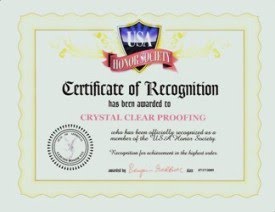Writing Numbers as Words
| 
Many readers have asked me why people write numbers this way: Example: We will need 220 (two hundred twenty) chairs. Isn’t it unnecessary to have both numerals and words for the same number? Rule of Thumb: There are two reasons for using both: 1. You are more likely to make an error when typing a numeral than when typing a word AND much less likely to spot the error when proofreading. 2. If your document is dense, has a lot of numbers, or contains large numbers, the numerical form helps your readers scan information quickly. So by typing a combination of a numeral and a word, you are almost guaranteed accuracy and ease of reading. Rule: Some authorities say that the numbers one through nine or ten should be spelled out and figures used for higher numbers. Other authorities spell out one through one hundred, plus even hundreds, thousands, and so on. The best strategy is to be consistent. Correct Examples: I want five copies, not ten copies. I want 5 copies, not 10 copies. Rule: Be consistent within a category. For example, if you choose numerals because one of the numbers you must deal with is greater than ten, you should use numerals for everything in that category. If you use numbers in different categories, use figures for one category and words for the other. Correct Example: Given the budget constraints, if all 30 history students attend the four plays, then the 7 math students will be able to attend only two plays.
(Students are represented with figures; plays are represented with words.) Incorrect Example: I asked for five pencils, not 50.
|
Source: Grammarbook
Copyright © 2009–2010 Crystal Clear Proofing. All Rights Reserved.











































Great examples. Always learn from you.
ReplyDeleteMason
Thoughts in Progress
I think you're absolutely correct about consistency being the key.
ReplyDeleteThere's an award awaiting you at my blog.
I think I got this one down now!
ReplyDeleteMason: Thank you! I've said this before, but it is genuinely so rewarding to hear that you learn something here at Crystal Clear Proofing! Makes it SO worthwhile!!
ReplyDeleteCarol: Thank you SO much for the lovely award! ♥
Diane: Fantastic! I'm glad to hear you've "got it" now! :)
In reading these, it seems the consistency issue really helps the writing flow. Thanks for sharing.
ReplyDeleteAnd, in the end, if it's a house style guide, the editor might change what you've written anyway. I always write out my numbers, although my editors want things like 911 written in numerals. Then there's the 'in dialogue' question as well. People speak in words, not numerals.
ReplyDeleteTerry
Terry's Place
Romance with a Twist--of Mystery
Crystal - You are so right! It's all about consistency. Most readers can be comfortable with either numerical or written-out numbers, so long as there is consistency. You make a well-taken point, too, about using both written and numerical numbers. I've seen that in research I've read, and it's quite helpful when there is a lot of information.
ReplyDeleteCool. Consistency always win out, huh?
ReplyDeleteThank you for this! Great examples!
ReplyDeleteConsistent - check!
ReplyDeleteI must be consistent, I must be consistent! I know I'm not so it's always fab to be reminded to be so!! :-) Thank you! Take care
ReplyDeletex
Joanne: ...And that's what everyone is aiming for! That the writing flows!
ReplyDeleteTerry: Numbers should not always be written out. As for "in dialogue," true — people do speak in words. But how they read, and following grammar rules, is another matter.
Margot: I couldn't have said it better! You have an excellent understanding of this!
Holly: For the most part, yes. However, as stated in other comments, as well as the post itself, there will always be times when you'll need to use both.
Talli: Thank you!!
Alex: Yes...but remember it's not all about consistency!
OK: LOL! Okay, I'll remind you — be consistent! Again I must add the BUT... because you will find it necessary to use both forms!
Great tips - I've run into questions about this before in my own writing. And your examples really make it easy to understand.
ReplyDeleteSusan: That's wonderful! I'm glad the examples helped clarify things for you!
ReplyDelete